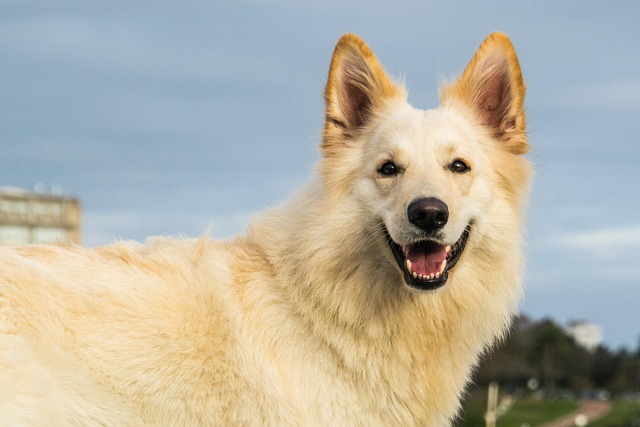
What is glaucoma in a dog?
You might notice your dog squinting more at mealtime or avoiding bright sunlight—these small changes could be early signs of a serious eye condition.
In the days we spend with dogs, we often find some confusing behaviors, among which dogs eating grass is a common one. When we see dogs burying their heads in grass, our hearts are always filled with questions: why do dogs eat grass? Aren't they carnivorous animals? In fact, the behavior of dogs eating grass contains many scientific principles and is closely related to their health and instincts.
From a physiological instinct perspective, dogs eating grass may have originated from their ancestor - wolves. When wolves survive in the wild, although they mainly feed on meat, they also occasionally consume some plants. This is because plants contain some beneficial components for their health, such as dietary fiber. Dietary fiber can promote intestinal peristalsis and aid digestion. Although dogs have undergone long-term domestication, they still retain this instinct in their genes. When dogs experience discomfort in their digestive system or require dietary fiber supplementation, they may alleviate the discomfort by eating grass. Just like how humans choose to eat vegetables and fruits rich in dietary fiber when suffering from gastrointestinal indigestion.
In addition, eating grass may also be a way for dogs to supplement their nutrition. Although dogs are carnivorous animals, their bodies also require a variety of vitamins and minerals. Grass contains abundant vitamins A, C, E, as well as some minerals such as calcium, iron, magnesium, etc. When dogs lack these nutrients in their bodies, they may instinctively search for grass to supplement them. For example, when a dog's diet lacks vitamin A, the carotenoids in the grass can be converted into vitamin A in the dog's body to meet their physical needs.
Health issues are also an important reason why dogs eat grass. Some dogs eat grass to induce vomiting. When dogs accidentally ingest something difficult to digest, such as hair, plastic fragments, etc., their bodies instinctively want to expel these foreign objects from the body. Grass can stimulate a dog's throat and intestines, causing a vomiting reflex that helps the dog expel foreign objects from its body. Just like how we relieve discomfort in the body by inducing vomiting after accidentally consuming unclean food. In addition, when dogs suffer from certain diseases such as gastrointestinal parasitic infections, gastritis, etc., they may also relieve their discomfort by eating grass. Because the rough texture of grass can provide a certain massage effect on the gastrointestinal tract, temporarily relieving pain.
From a behavioral perspective, dogs eating grass may also be a curiosity driven behavior. Dogs are full of curiosity about the world around them and enjoy exploring new things. When they see the tender green grass on the grassland, they may try to take a bite out of curiosity. Moreover, during the growth process of dogs, if they see other dogs eating grass in their infancy, they may also imitate this behavior.

When we notice a dog eating grass, we should not panic too much, but we should also not take it lightly. We need to carefully observe the dog's reaction after eating grass. If dogs do not experience any abnormalities such as vomiting, diarrhea, etc. after eating grass, it may just be their normal behavior. But if dogs experience frequent vomiting, diarrhea, and mental fatigue after eating grass, they need to be taken to a veterinarian in a timely manner to rule out health problems.
Although the behavior of dogs eating grass may seem simple, it reflects their physiological needs and health status. As dog owners, we should give them enough attention and care. In daily life, it is important to ensure that dogs have a balanced diet and are provided with the various nutrients they need. At the same time, it is important to regularly take dogs for physical examinations to promptly identify and address potential health issues. Every moment when dogs eat grass is an opportunity for us to gain a deeper understanding of them. Let us accompany our dogs to grow up healthy and happy with love and patience, and let them spend every beautiful day under our care. Because dogs are not only our pets, but also indispensable family members in our lives, their health and happiness are our greatest concerns.

You might notice your dog squinting more at mealtime or avoiding bright sunlight—these small changes could be early signs of a serious eye condition.

Let’s set the scene: It’s a sweltering Phoenix afternoon—105°F outside—and you rushed your 2-year-old Lab mix, Cooper, on a quick walk to “get it over with.”

Let’s get real: You’re in your Miami apartment, watching your 3-year-old Corgi, Loki, struggle to climb the stairs to your second-floor unit.

Many dog owners brush off occasional scratching as just “dog behavior,” but persistent itching often signals something more—like a food allergy.

You might first notice your dog scratching more than usual—chewing at their paws until the fur looks thin, or rubbing their face against the couch nonstop.

Let’s be real: You’re standing in your Chicago apartment, watching your 3-year-old Beagle, Max, huff and puff just to climb onto the couch.